General
Nkrumah’s Legacy, Influence on Future Generations Endures
Published
9 months agoon
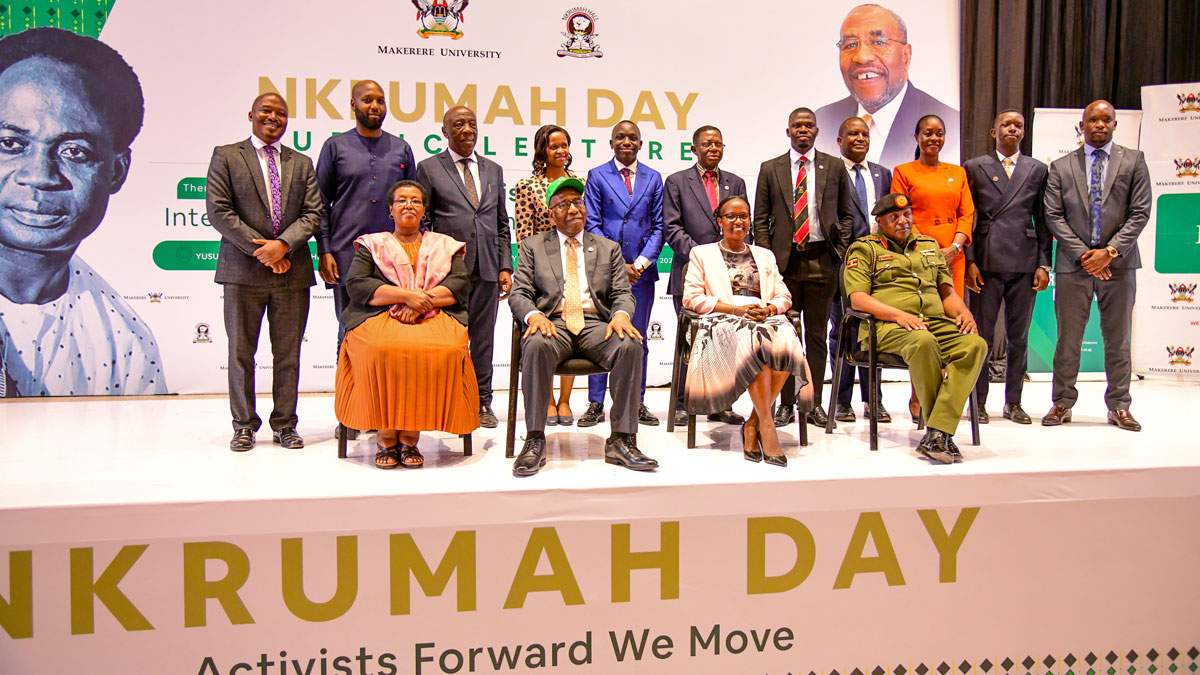
By Ritah Namisango
On September 21, 2024, the walls of the Yusuf Lule Auditorium at Makerere University reverberated with tributes of the powerful legacy of Kwame Nkrumah, a titan of Pan-Africanism and a visionary leader whose influence continues to shape the aspirations of the African continent. As the university celebrates the 70th anniversary of Nkrumah Hall, tribute was paid to titan’s unwavering commitment to African unity, as students, scholars, and dignitaries gathered to reflect on the profound impact of his ideals.
This momentous occasion which featured a public lecture and celebrations at Nkrumah Hall grounds, was a resounding call to action for today’s students and young people to embody Nkrumah’s dream of a unified and independent Africa. With the weight of history on their shoulders, speakers such as Rt. Hon. Dr. Ruhakana Rugunda inspired the audience to envision a future where African nations stand together against the forces of division and exploitation.
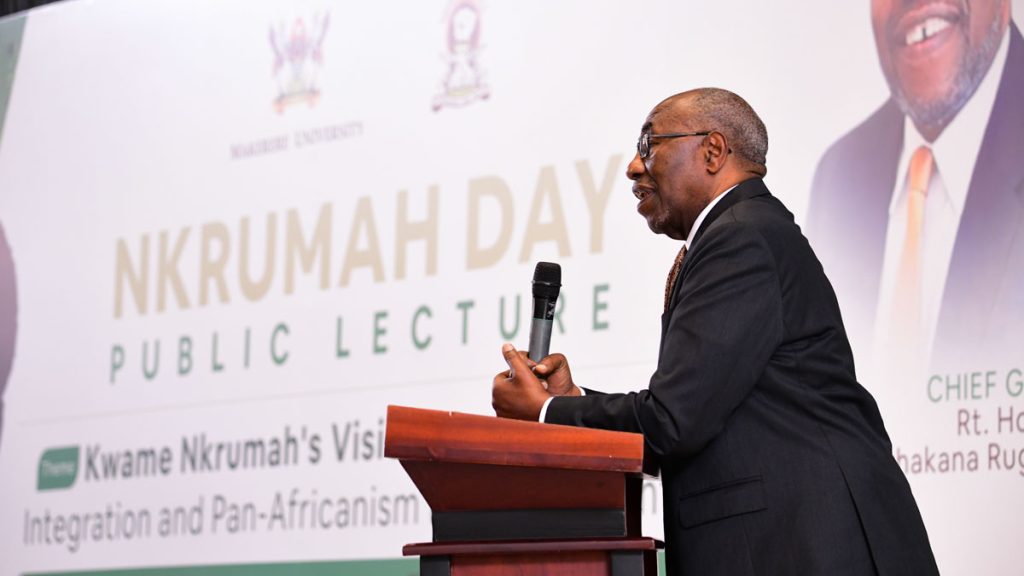
Dr. Ruhakana Rugunda, Prime Minister Emeritus and special envoy of His Excellency the President of Uganda, urged the younger generation to embrace the legacy of Kwame Nkrumah in the pursuit of a unified and independent African continent, calling for collective action in the face of adversity.
He highlighted Kwame Nkrumah as a prominent African leader and a pivotal figure in the quest for African unity. He emphasized that African continental agreements are a direct outcome of the philosophy of Pan-Africanism and African unity that Nkrumah championed during the challenging times when many African countries were still under colonial rule.
Dr. Ruhakana Rugunda noted that there is much to learn from Kwame Nkrumah, but what stands out most is his unwavering commitment to seeing Africa united, free, and independent—determining its own destiny, making its own decisions, and achieving enlightenment. He stressed that Nkrumah’s vision for a united Africa was rooted in the belief that political and economic cooperation among African nations is vital for achieving true independence and sustainable development. He argued that colonialism and imperialism can only be effectively confronted through unity and collective action.
“Upon Ghana’s independence in 1957, Kwame Nkrumah stated that the freedom of Ghana would be meaningless unless it was linked to the liberation of the entire continent. To this end, he ensured that Ghana served as a political and military base for training African freedom fighters to prepare for their respective nations’ liberation. This commitment inevitably created tension between Nkrumah and several oppressive colonial regimes across Africa, but he remained resolute in his mission. Ultimately, his efforts gained significant momentum,” Dr. Rugunda remarked.
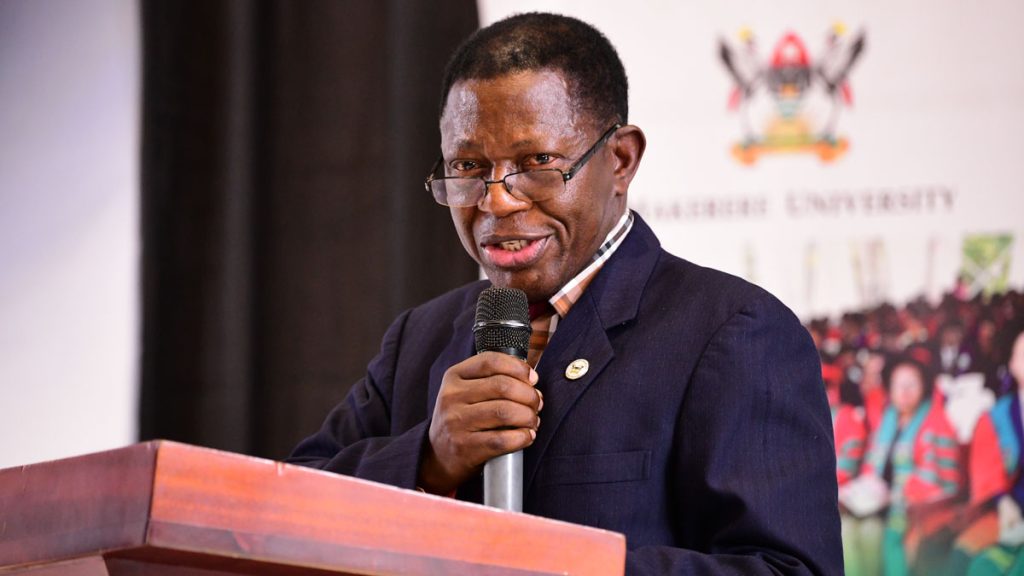
Dr. Ruhakana further highlighted that Nkrumah, alongside his political party, the Convention People’s Party (CPP), collaborated with numerous freedom fighters and Pan-Africanists both from the diaspora and within the continent. He emphasized the mutual influence among these leaders, which propelled their shared causes forward. Dr. Ruhakana identified key allies such as Julius Nyerere (Tanzania), Gamal Abdel Nasser (Egypt), and Patrice Lumumba (Democratic Republic of the Congo), along with Dr. W.E.B. Du Bois from the diaspora. He noted that Dr. Du Bois, the first Black individual to earn a PhD from Harvard University, was dedicated to connecting the diaspora with the African continent. He was also a pivotal intellectual leader in the struggle for African American rights and equality.
He explained that Nkrumah recognized how colonial powers aimed to weaken and divide Africa in order to exploit its natural resources and people, leading to the enslavement of Africans while developing other parts of the world. This exploitation served the interests of others, rather than those of the African people. Consequently, Nkrumah understood that Africans needed protection.
“Nkrumah realized that without protection, Africans would continue to be exploited. He asserted that Africa must unite. He authored a classical text titled ‘Africa Must Unite,’ in which he passionately articulated the importance of trade and collaboration among African nations. Even 45 years ago, his insights into the dangers of colonialism and neo-colonialism, which he described as the final stage of independence, were profoundly relevant,” he stated.
“President SékouTouré of Guinea declared Kwame Nkrumah co-President of Guinea—an honor I have not heard being bestowed upon anyone else in the world. His special duty as co-president was to champion the cause of African liberation. He had previously done so in Ghana, and President Sékou believed he would do it again. A year later, in 1967, Nkrumah organized the All-African Peoples’ Conference in Accra, resolutely inspiring the struggle for independence and liberation across Africa,” Dr. Ruhakana Rugunda noted.
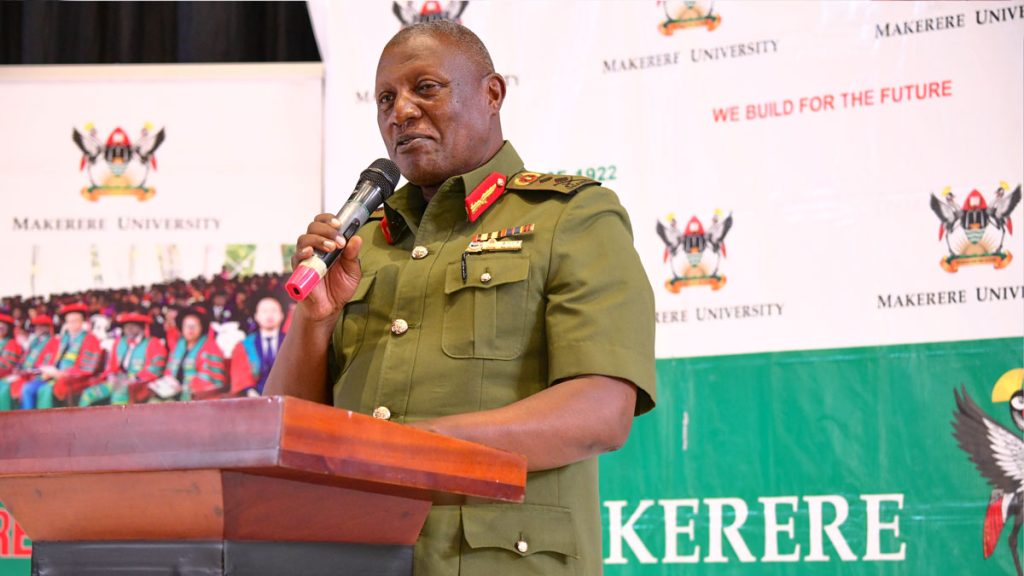
Reflecting on his time at Makerere University, Dr. Ruhakana Rugunda shared that he joined the institution in 1969 as a medical student under the chancellorship of Mwalimu Julius Nyerere, a distinguished alumnus of Makerere. At that time, the university was relatively small, and had only a few halls of residence. He was assigned to a hall known as New Hall, which was later renamed Nkrumah Hall in 1970.
Dr. Ruhakana Rugunda emphasized the significance of the renaming of the New Hall. He recounted that when he joined Makerere University, there was considerable student activism that mirrored the broader movements both in Uganda and across the African continent. The struggle against colonialism was intensifying, and Africa was on a path to liberation, with Kwame Nkrumah serving as an iconic figure in this quest. He was a leader who dedicated Ghana’s resources to the collective benefit of the continent.
“So, the students at New Hall convened in the Senior Common Room and passed a resolution to give New Hall a name that honored its significance. The name selected was Nkrumah. This resolution was passed overwhelmingly, and I am proud to have been part of that decision. The name Nkrumah was then forwarded to the warden and the university administration, who accepted it. That is how the name came about. I am also glad to see that there is an appropriate statue in front of the hall, commemorating an iconic figure in Africa’s history,” Dr. Ruhakana Rugunda remarked.
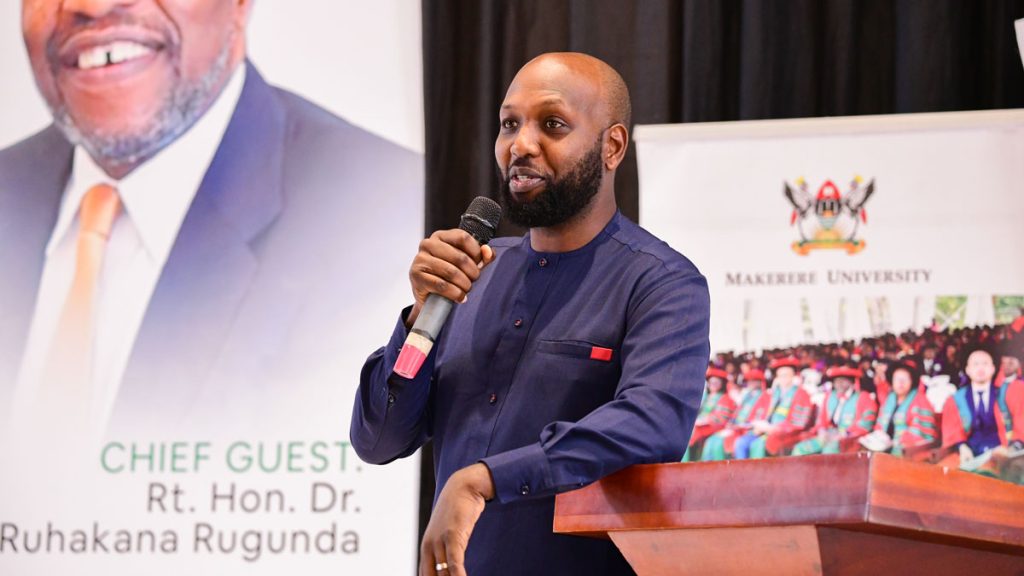
He urged the audience to continually add value to the teachings and philosophy of Kwame Nkrumah in order to support the independence, self-determination, and decision-making of the African people, as well as to promote their unity. He emphasized that unity is essential for harnessing Africa’s vast natural resources, which are often exploited by others. He commended Makerere University for hosting the event and suggested that it should become an annual celebration.
“I would like to express my gratitude to Makerere University and the leadership of Nkrumah Hall for organizing this event and fostering an environment conducive to symposia and discussions of this nature. I recommend that this become an annual event to ensure that more students and the general public are reminded of the vision, ideals, and significant contributions of the iconic Pan-Africanist Kwame Nkrumah and what he advocated for,” he concluded.
Reflecting on the colonial powers’ efforts to weaken and divide Africa, Maj. Gen. Henry Masiko, Chief Political Commissar of the Uganda People’s Defense Forces (UPDF), remarked that Africa was treated like a cake, with its resources plundered and controlled. He noted that Nkrumah recognized that independence would be meaningless without addressing the distortions, particularly the issue of division.
“Nkrumah understood the four essential goals of independence, which can be summarized as five key objectives: First, ensuring that liberation is not exclusive to a select few. Second, that Africa must be free, as the struggle in many places was for immediate independence. Third, it is not enough for people to be free, they must also prosper. Nkrumah viewed the prosperity of the African people as a crucial aim of independence. Fourth, reassembly of Africa as one united entity. Lastly, the need to recover African dignity, heritage, culture, and identity. He fully grasped these five objectives and was especially passionate about the reintegration of Africa,” Maj. Gen. Masiko stated.
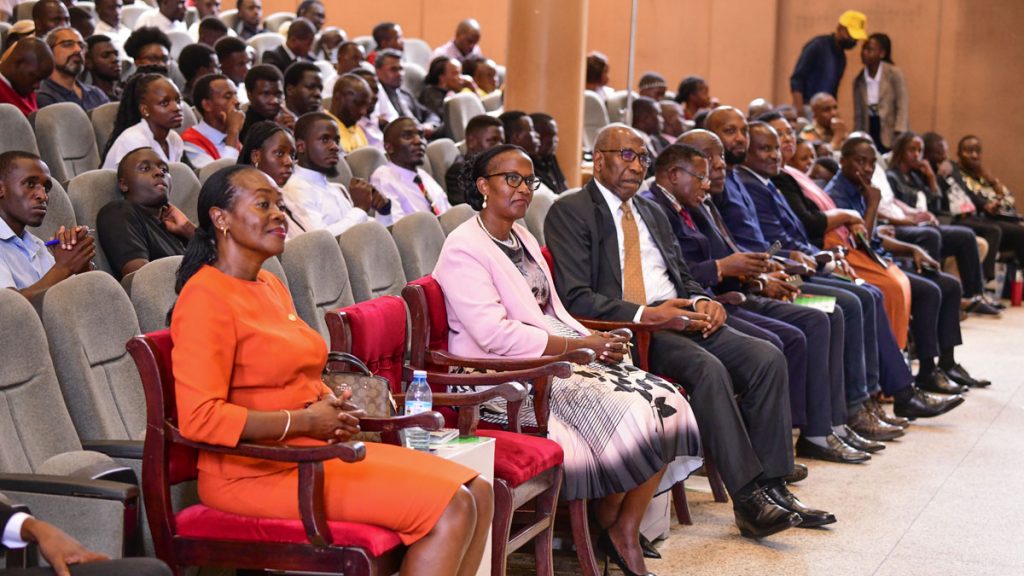
In his description of Africa, Maj. Gen. Masiko referred to it as the cradle of humankind, a continent rich in resources and the origin of civilization. He emphasized that Africa pioneered civilization, boasting of great empires like the Ghana Empire, the Mali Empire, and the Timbuktu civilization. Despite this, he noted that over the last 600 years, Africa has found itself at the bottom of the global hierarchy, regarded as the most marginalized and despised continent. He pointed out that this represents a contradiction that intrigued heroes namely Kwame Nkrumah and his compatriots.
“Africa, glorious in many ways, is now seen as the last. They understood that this decline resulted from a combination of mistakes and natural challenges that led to disastrous outcomes. The first disaster was the enslavement of our people, forcibly shipped away and scattered across the globe. This was a degrading catastrophe, as many Africans were reduced to the status of slaves. Following the horrors of slavery came the further degradation through colonization, which devastated Africa,” Maj. Gen. Masiko lamented.
As a champion in the formation of the Organization of African Unity (OAU), Maj. Gen. Masiko highlighted that Nkrumah’s dream during the founding meeting in Addis Ababa was to establish a United States of Africa (USA). According to Maj Gen. Masiko, Nkrumah urged all those gathered in Addis Ababa to leave their individual flags behind and raise the flag of a united Africa, advocating for one president, one army, and one government. He even expressed his willingness to step down as President of Ghana if other leaders would agree to form a unified African government in Addis Ababa. While he envisioned a cohesive and united Africa, today we still find ourselves categorized as the Fragmented States of Africa (FSA)! He reiterated that as we gather to commemorate Kwame Nkrumah, we must embrace his dream of unity.
“Kwame Nkrumah had a dream of reuniting Africa, and we must return to that vision. It remains relevant today. Nkrumah leaves us with the challenge he could not fulfill, but his spirit lives on. Imagine that reality of a unified Africa—why not? Perhaps in your lifetime, you could serve as a commander of the United Forces of Africa or serving in the federal government for the continent. That dream should not be regarded as in vain,” Maj. Gen. Masiko stated.
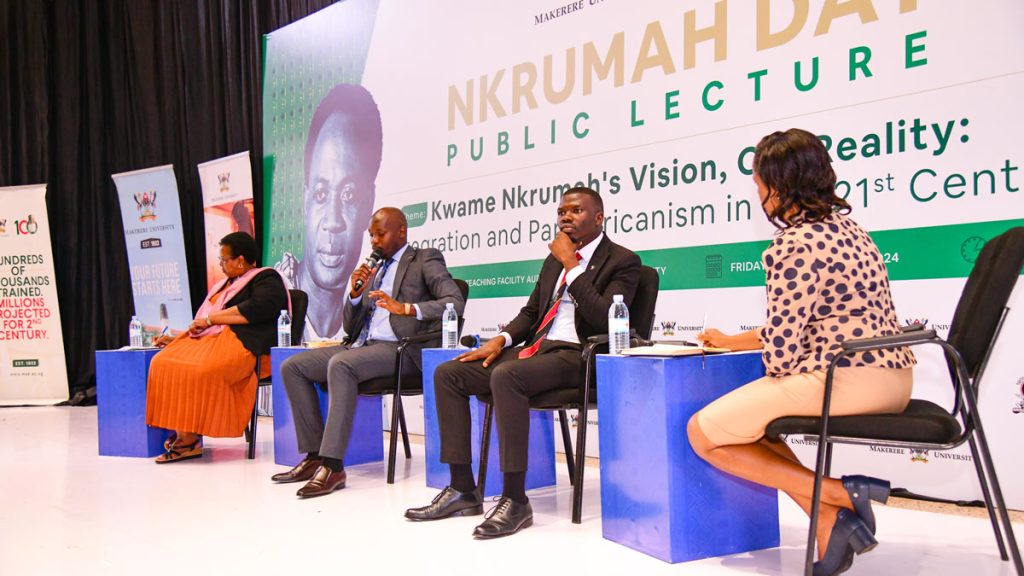
Reflecting on the Berlin Conference, which resolved to scramble and partition the continent, Maj. Gen. Masiko noted that European colonialists spent four months – from November to February devising ways to divide and share Africa among themselves, with no African representatives present at that meeting. He suggested starting a symbolic initiative by declaring these months as a “Months of Disaster” for Africa.
“The meeting in Berlin took place over November, December, January, and concluded in February. So why don’t we designate these four months as African Month of Remembrance for the disaster that occurred in Berlin? We could preach about and condemn the outcomes of the Berlin Conference while wearing black ribbons on our shoulders. I believe this could help awaken Africans to the reality of that disaster,” he proposed.
He revealed to the audience that there is still hope for Africa to reunite, citing a notable example: if Berlin, a city once divided to form East and West Germany, was reunited after the fall of the Berlin Wall, why can’t Africa, which only has imaginary borders, do the same? He thus urged the younger generation to carry forward the gospel of unity as Kwame Nkrumah did.
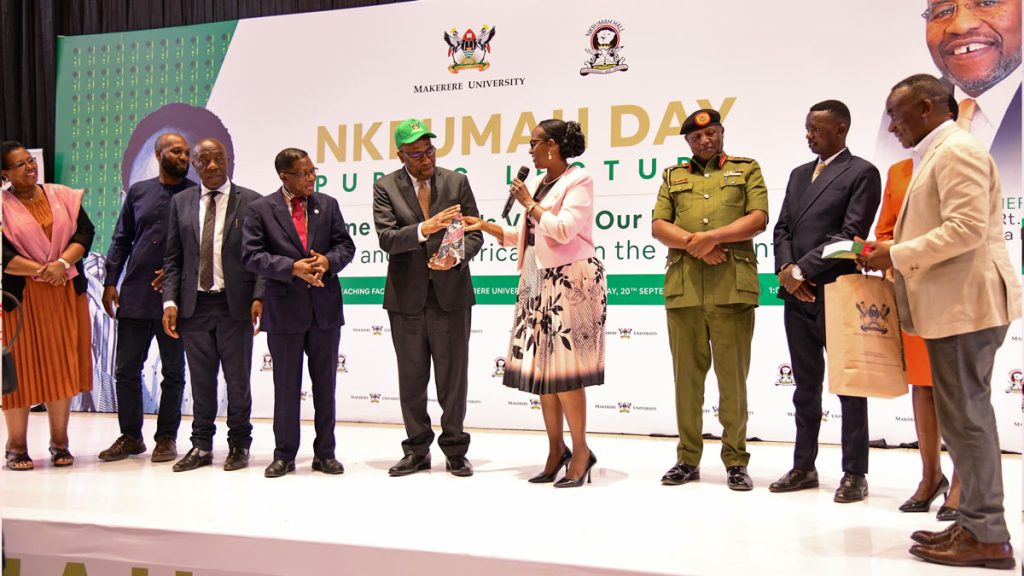
“The same Berlin was divided, not by rivers or natural boundaries like ours, but by a brick wall that separated Germany. I don’t know how many years they spent as East and West Germany, but they eventually woke up, broke down the wall, and reunited. For us Africans, since 1884, there have been no brick walls. So, young people, if we are unhappy with the divisions that exist, what should we do? I often hear phrases like ‘porous borders.’ Who told you there are porous borders? Porous implies there are holes, but these are merely artificial, imaginary colonial lines in your minds, and you call them porous borders,” he highlighted.
Discussing regional integration, particularly the East African Community (EAC), which currently comprises seven member states, including South Sudan, and the Democratic Republic of Congo (DRC), he shared his experience visiting refugee camps in Uganda. He noted that most of the refugees in these camps were from South Sudan and the DRC. He questioned the efficacy of the EAC by asking, “How can members of a community be refugees within their own community?”
In her speech, Mrs. Lorna Magara, Chairperson of the Makerere University Council, emphasized that Kwame Nkrumah’s vision for a politically united and economically independent Africa is as relevant today as it was during his lifetime. As a champion of Pan-Africanism, Nkrumah advocated for a united front against colonialism and the self-determination of African nations. Mrs. Magara asserted that Nkrumah’s dream extended beyond Ghana; it encompassed the aspiration for the entire continent to unite as one.
“Kwame Nkrumah was a great and charismatic man who inspired the fight for independence for Africa. His vision for a politically united, economically independent, and socially equitable Africa is an ideal we must integrate into our educational culture, social, and political environments. Today, we learned of Kwame Nkrumah’s tremendous influence and how he inspired the change of name from New Hall to Nkrumah Hall. Listening to these stories reaffirms the importance of intergenerational conversations to inspire the young generation to live by conviction and for a greater cause,” she said.
She called for a renewed commitment to Nkrumah’s ideals, particularly among the youth, who represent the future of Africa with 73% of Uganda’s population under the age of 17. She said that it is crucial to inspire the next generation to embrace the values of unity and cooperation that Nkrumah championed. She encouraged young people to engage in conversations about their history and the legacies of those who fought for their freedom.
“There is a growing and urgent need to prioritize these conversations, where values and norms are communicated from one generation to another. The recent population census statistics recorded that 45,900,000 Ugandans, out of which 73% are under 17, and only 5% are above 60. With these statistics, there is an incredible opportunity and also a challenge to influence the most significant percentage of the population. The idea of passing on values and knowledge from the old to the young through conversations and storytelling, like we used to do in the past, is the heart of this effort. This is one of the reasons why this engagement of bringing our esteemed alumni to engage with current students is of great importance,” Mrs. Magara stated.
Mrs. Magara proposed the establishment of “Ekyooto,” a fireside discussion for young people to engage in discussions about Nkrumah’s vision and explore ways to actualize it in today’s context. She emphasized the importance of bridging the generational gap and empowering the youth to carry forward the torch of unity and purpose.
“We have begun having what we call “Ekyooto” where young people and university students, come around to discuss these matters. I have a proposal that from this discussion, we have a ‘kyooto’, to articulate together with our elders what we need to do, to actualize the ideals of Kwame Nkrumah and his colleagues.We have to bridge the gap. We talked about passing on the baton, and we heard that Kwame Nkrumah picked the baton from his elders,” she said.
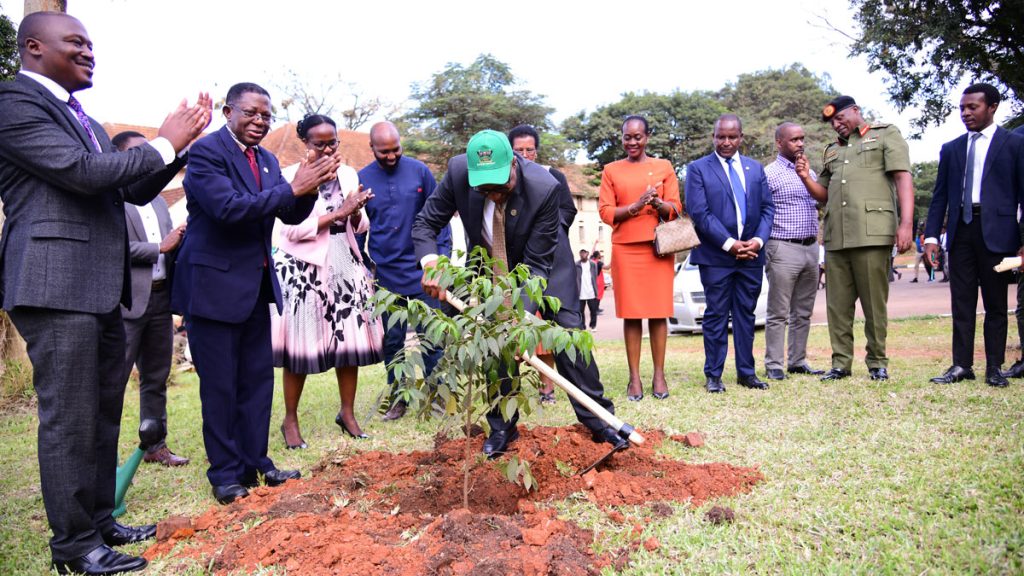
In today’s digital age where social media significantly shapes the cultures and attitudes of the young generation, often to the detriment of their mental and social well-being, Mrs. Magara emphasized the importance of prioritizing mentorship and guiding students toward purposeful living. She expressed particular delight, acknowledging the efforts of students, especially the chairperson and her council, in initiating the vital dialogue. Mrs. Magara urged them to remain curious about the history and the narrative of the African continent as well as the legacies of the great leaders who fought for independence and shaped the society we have today.
Mrs. Magara expressed her gratitude to all participants for their dedication to preserving Nkrumah’s legacy. She said that their presence was a testament to their commitment to the shared cause of preserving and promoting Kwame Nkrumah’s legacy whose ideals are vital for shaping a future where Africa stands united and strong.
Prof. Buyinza Mukadasi, the Acting Vice Chancellor of Makerere University, reaffirmed that Kwame Nkrumah remains a symbol of African pride. His vision and hope for a united Africa continue to inspire leaders across the continent and instill pride in Africans regarding their heritage and identity. He commended the students and residents of Nkrumah Hall for organizing the event, with support from the Office of the Dean of Students.
“I am very much delighted to join you all in celebrating the legacy and the day of birth of our African icon, the late Kwame Nkrumah. It is an indication that his ideals and legacy continue to inspire these generations. And for this, we shall be grateful for his contributions and his works for eternity,” he remarked.
Prof. Buyinza Mukadasi credited the Guest of honor, Dr. Ruhakana Rugunda for his contribution towards good leadership and revolutionary ideas. He also welcomed him and Maj. Gen. Henry Masiko back to Makerere University, their alma matter.
With profound pleasure, Dr. Winifred Namuwonge Kabumbuli, the Dean of Students at Makerere University, remarked that the name Kwame Nkrumah has stood the test of time, resonating like a beautiful horn across the African continent and beyond. She emphasized the importance of focusing on Nkrumah’s views on integration and Pan-Africanism that he championed and articulated to address the challenges of our time.
“Nkrumah saw all those things and realized that there was a need to have home-bred solutions to address the challenges of Africa in order to have a stable and strong nation. Therefore, this symposium aims to honor the legacy of Kwame Nkrumah as well as inspire a new generation of leaders to work towards a strong, prosperous, economically and politically strong African nation.
Kwame Rugunda, son of Dr. Ruhakana Rugunda and named in honor of the great Pan-Africanist Kwame Nkrumah, acknowledged the responsibility young people have to continue the work laid down by previous generations of Africans. He reiterated that while Kwame Nkrumah is celebrated as the father of Pan-Africanism, he also inherited the baton from earlier Africanists who championed the ideals of unity and cooperation across the continent.
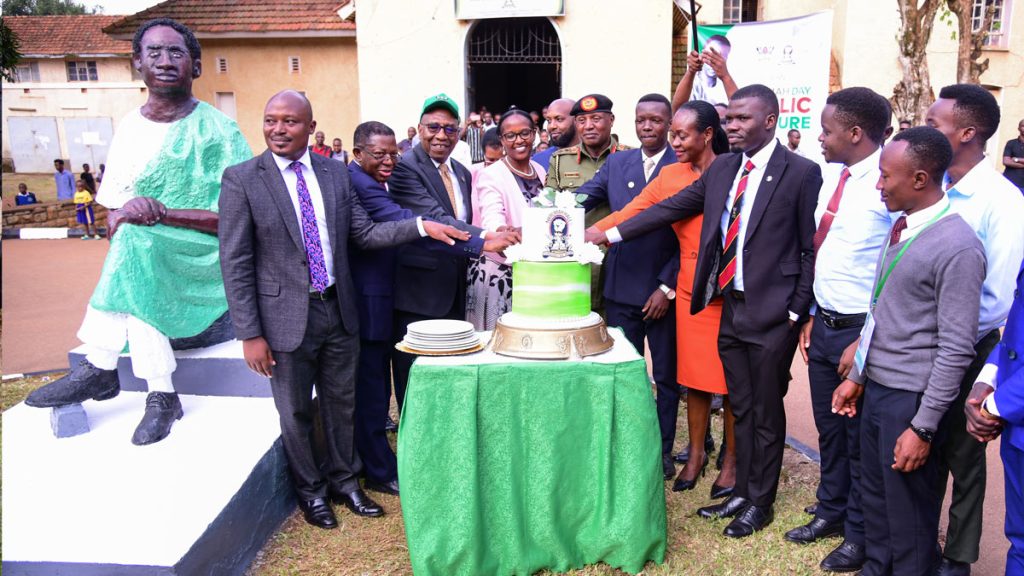
“Kwame Nkrumah picked up the baton from a previous generation, leading Ghana to independence in 1957 and continuing the vital work of Pan-Africanism. As a remarkable champion for the continent, he eventually passed the baton to the next generation, including leaders like Dr. Rugunda and others. Our task as young people is to receive this baton and carry forward the significant mission of advancing the African cause,” Kwame Rugunda emphasized.
He called upon young Africans to contribute actively to the ongoing struggle for their destiny, unity, and Pan-Africanism. “If there is one lesson to take away from today, it is the importance of learning from those who came before us and playing our part in advancing the African continent. We must not look to the West or the East for our direction; we are the architects of our own destiny,” he concluded.
The celebration of Kwame Nkrumah at Makerere University serves as a poignant reminder of the enduring legacy of one of Africa’s greatest visionaries. His unwavering commitment to Pan-Africanism and unity continues to inspire generations, urging us to confront the challenges of our time with a collective spirit. As leaders and students reflected on Nkrumah’s ideals, it became apparent that the path to a truly independent and prosperous Africa lies in our hands.
You may like
General
Special Exam Results -Diploma in Performing Arts 2025/26
Published
2 days agoon
June 28, 2025By
Mak Editor
The results for the 2025/2026 special entry examination for the Diploma in Performing Arts held on Saturday 17th May, 2025. Candidates who scored a final mark of 50% and above passed the Examination and have been recommended to the university’s Admissions Committee for consideration.
General
Mature Age Scheme Exam Results for 2025/2026
Published
3 days agoon
June 27, 2025By
Mak Editor
The Office of Academic Registrar, Makerere University has released full results for the Mature Age Entry Scheme Examinations for the Academic Year 2025/2026 held on Saturday 14th December, 2024.
The Candidates who scored a final mark of 50% and above passed the examination and have been recommended by the Pre-Entry & Mature Age Committee to the University’s Admissions Board for Consideration.
The Aptitude Exam Results for 2025/2026 Academic Year released in February 2025 can be found here.
General
Call for Application: 2025 SNRM session 4 Summer School
Published
4 days agoon
June 26, 2025By
Mak Editor
Context:
Natural resources in Africa are being depleted at an alarming rate due to several factors, including unsustainable human activities, climate change, and population growth. A primary condition of sustainable development is to ensure that the pressures do not exceed the environmental limits, and that demand for the resources does not exceed levels that can be sustainably provided by nature. Therefore, there is a pressing need for transformative, systems-thinking approaches and tools that can tackle the diverse challenges facing these systems. In Africa, this need is compounded by a lack of data and monitoring, which significantly hinders sustainable decision-making.
Investing in young scientists who are committed to take lead in sustainable management of Africa’s natural resources is very important. Capacity building of young scientists will enhance their knowledge and skill on sustainable natural resources and their involvement for implementation of the sustainable development goals (SDG’s) in Africa. To this effect, SNRM summer schools have been implemented in three sessions in 2019, 2020, and 2022 with support from Volkswagen Foundation; to build a critical mass of skilled and competent young natural resource scientists in Africa through training, capacity building and mentorship. Session 4 (2025) will target competent young scientists (MSc and PhD students) in Africa and Germany to further develop their knowledge and skills in systems thinking, advanced data collection and analysis, and application of emerging digital technologies such as Artificial Intelligence (AI), machine learning (ML), internet of things (IoT), and embracing transdisciplinary approaches. In addition, we include an ideation workshop where students can work on real problems to come up with solutions for sustainable transformations in natural resource use.
Organizers: Leibniz Universität – Hannover (Germany), University of Antananarivo, University of Abomey Calavi (Benin), Makerere University (Uganda), University of Ghana (Ghana), University of Parakou (Benin), The Technical University of Kenya, with financial support from the Volkswagen Foundation (Germany).
Venue and dates: Nairobi, Kenya, 16-28 November 2025
Target: MSc and PhD students, early in the program of less than 35 years of age from any university/research institution in either sub-Saharan Africa or Germany with an interest in natural resources management.
Participants and Scholarships: The course is fully funded and open to 20 MSc and PhD students from Africa, and 5 from Germany. Funding will cover the costs of air ticket, accommodation, meals, visa, and transportation. However, participants will cover the cost of their travel health insurance.
Topics
SNRM Summer School Session 4: Transformative pathways in biodiversity management and conservation.
This summer school is designed to deliver four modules over a two-week period. The modules are designed to enable the students to acquire new ways of designing data collection protocols and analysis for transformative sustainable natural resources management.
Module 4.1: Data collection I
Skills in data collection for a transformative and sustainable management of natural resources (water, wildlife, forest, land, livestock, crops) monitoring and data collection techniques; remote monitoring tools, earth observation system data, e.g. satellite data sources, LIDAR, and UAV aerial images. Collect and analyse In-situ data on biotic and abiotic parameters, map and analyse data using R or Google Earth Engine, field data collection and retrieving data from online databases.
Module 4.2 Data management and processing
Introduction to tools and methods of managing large and diverse data sets of natural resources such as time series, spatial, directional, and multivariate data. Practicals will include data storage, organization and conversion into various formats using databases such as PostgreSQL and statistical programming software such as R and Python; scripts.
Module 4.3 Ecological monitoring, modelling and management
This module aims to teach participants how to anticipate and validate trends that can be observed in various ecosystems. Lectures include ecological monitoring and its design; population monitoring studies; metrics in population monitoring; methods for monitoring and assessing marine ecosystems; human ecology to socio-ecological systems; climate change impact of ecosystems; suitability assessments; overview of the principles underlying wildlife monitoring and prediction systems for climate change adaptation. Practicals will include field data collection (individual and group); ecological data analysis using R or PAST; modelling and experiencing the behaviour of complex systems using Vensim.
Module 4.4 Natural habitat restoration ideation lab
This module is designed to spur students’ innovation and creativity, and to help students comprehensively identify interdependencies across the 17 SDG goals. Participants will be trained on ideation processes for solutions and intervention for transformative natural resource management. They will work collaboratively in small groups on case studies and develop pathways of transformative sustainable natural resource management. Examples of projects include forest (mangrove) ecosystem and habitat restoration, improved technologies for agricultural production, nature-based solutions for improving water quality, and reversing land degradation.
Language: The course will be delivered in English. Participants are expected to be fluent in writing and speaking the English language.
How to apply
Applicants are kindly requested to fill in the application form available from https://snrmafrica.com/ and submit the following documents in English through the system.
- a curriculum vitae (maximum 2 pages)
- a letter of motivation (maximum 1 page)
- a confirmation of university enrolment
- a reference letter from the academic supervisor
- project summary of MSc/ PhD project (1 page including objectives, methodology
and key findings or expected outcomes).
Important dates
Application deadline: 30th June 2025.
Announcement of accepted applicants: 15th August 2025.
Confirmation of attendance by selected participants: 12th Sept 2025.
Summer school held: 16 – 28 Nov 2025.
Further information is available from
The secretariat info@snrmafrica.com
Dr Lydia Olaka lydiaolaka@tukenya.ac.ke
Prof. Dr. Hartmut Stuetzel stuetzel@gem.uni-hannover.de
Trending
-

 General3 days ago
General3 days agoMature Age Scheme Exam Results for 2025/2026
-

 General6 days ago
General6 days agoFreshers’ Joining Instructions 2025/2026
-

 General1 week ago
General1 week agoMastercard Foundation Board pays its inaugural visit to Makerere University
-

 General1 week ago
General1 week agoUVCF Makes Case for HEAC Programme
-

 Natural Sciences2 weeks ago
Natural Sciences2 weeks agoCoNAS Participates in the 2025 National Science Week Exhibition
